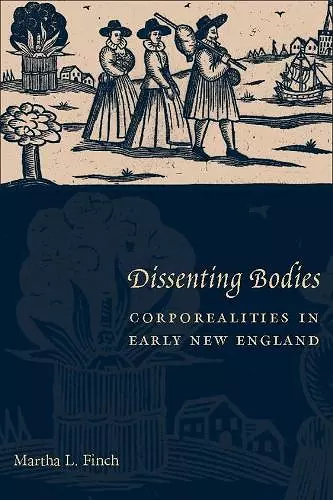Dissenting Bodies
Corporealities in Early New England
Format:Hardback
Publisher:Columbia University Press
Published:11th Dec '09
Currently unavailable, our supplier has not provided us a restock date

To get a handle on the types of bodies that inhabited the challenging seventeenth-century New England landscape, Martha L. Finch combs a wide variety of literature (scientific theory, travel narratives, court records, diaries, letters, and histories) to tease out the many ways that Puritan theology was inscribed onto bodies. The result is a provocative and interdisciplinary work that will captivate a large reading audience. I recommend it with enthusiasm. -- Amy DeRogatis, Michigan State University, and author of Moral Geography Martha L. Finch's interest in the humanity of her subjects is always paramount. She wears her theoretical sophistication lightly; it never overpowers or detracts from her almost relentless quest to imagine the lives of subjects as fully and accurately as possible. I will not be alone in considering this work a significant contribution to American religious history. -- Amanda Porterfield, Florida State University Dissenting Bodies is a provocative new study of how people in the seventeenth-century Plymouth Colony--Indians and colonists, pastors and parishioners--inhabited several corporealities at once. Drawing upon a wide variety of historical sources, Martha L. Finch effectively demonstrates the delicate interplay of bodies and beliefs. She argues that the human figure was both emblem and commodity, and that such religious practices as sacraments, meetinghouse design, disease, and death were materialized through bodily referents. Dissenting Bodies itself embodies revelation with every turn of the page. This is a daring yet totally convincing book. -- Robert St. George, University of Pennsylvania We are close now to knowing as much about New England bodies as we once did New England minds and souls. Dissenting Bodies represents a significant stride along that path to a fully corporeal history of early American religion. Through her focus on the Plymouth Colony, Finch is able to explore the Calvinist theological framing of the body alongside the lived practices of embodiment within a particular English separatist community. The fabric of godliness for all its plainness becomes, in Finch's hands, sumptuous material. -- Leigh Eric Schmidt, Harvard University
For the Puritan separatists of seventeenth-century New England, "godliness," as manifested by the body, was the sign of election, and the body, with its material demands and metaphorical significance, became the axis upon which all colonial activity and religious meaning turned. Drawing on literature, documents, and critical studies of embodiment as practiced in the New England colonies, Martha L. Finch launches a fascinating investigation into the scientific, theological, and cultural conceptions of corporeality at a pivotal moment in Anglo-Protestant history. Not only were settlers forced to interact bodily with native populations and other "new world" communities, they also fought starvation and illness; were whipped, branded, hanged, and murdered; sang, prayed, and preached; engaged in sexual relations; and were baptized according to their faith. All these activities shaped the colonists' understanding of their existence and the godly principles of their young society. Finch focuses specifically on Plymouth Colony and those who endeavored to make visible what they believed to be God's divine will. Quakers, Indians, and others challenged these beliefs, and the constant struggle to survive, build cohesive communities, and regulate behavior forced further adjustments. Merging theological, medical, and other positions on corporeality with testimonies on colonial life, Finch brilliantly complicates our encounter with early Puritan New England.
A fine contribution to a corporeal history of American religion. -- Robert Fuller Journal of Church History [An] important new study. -- Adrian Chastain Weimer Religion
ISBN: 9780231139465
Dimensions: unknown
Weight: unknown
296 pages